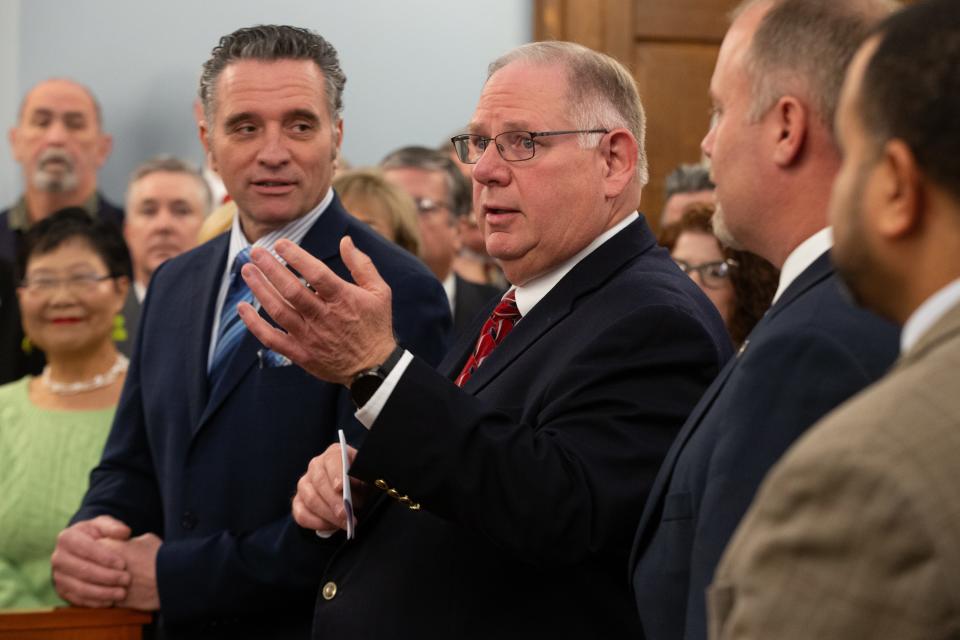Kansas lawmakers call for convention of states as court decides if 2023 vote was valid
Kansas lawmakers proposed calling for, and establishing a process of selecting delegates for, a Convention of the United States, a never-before-used legal process to amend the U.S. constitution that is facing a judicial decision that could make the process more likely.
The only convention of states held in the United States was done to draft the constitution in 1787, and the process laid out in Article V of the constitution has never been invoked. All 33 amendments to the U.S. Constitution passed via the only other option to change the constitution, a two-thirds vote in both chambers of Congress that is then ratified by three-fourths of states.
A Senate resolution that would call for a convention of states is narrowly targeted on enacting term limits, but opponents argued that the scope of amendments couldn’t be delegated by state legislatures that call for a convention. So far six states have called for a convention of the states to install term limits for U.S. congressmen and 29 have done the same to balance the federal budget.
House Bill 2807 addressed appointments to the convention, saying that they will be appointed by different political leaders in the state legislature. It also laid out punishments for delegates that exceed the scope of what they’re sent to the convention to do.

If a Kansas delegate proposes and votes on topics not included in the reason for calling the convention, the delegate could be subject to recall and brought up on criminal charges. Opponents said federal legislation would supersede any provision punishing a state’s delegates.
“If the states are participating in the federal process when they apply for a convention under Article V, certainly the delegates are also participating in a federal process when they’re participating in the convention,” said John Axtell, volunteer coordinator with Kansas Campaign for Liberty. “The delegates, once they are seated, are free to do as they wish, with the words of this bill being only a suggestion.”
As both chambers consider legislation on the evocation and processes that would guide a convention of the states, a lawsuit in the U.S. District Court of Kansas could significantly lower the bar for the state to call for a convention.
Sen. Mike Thompson, R-Shawnee, and Rep. Michael Murphy, R-Sylvia, brought a suit against Senate President Ty Masterson, R-Andover, and House Speaker Dan Hawkins, R-Wichita, alleging that any resolution to convene a convention of states only needs a simple majority rather than a supermajority. Masterson and Hawkins voted for the resolution to declare a convention of states.
“These concurrent resolutions should be declared to have passed both Chambers by majority votes and thereby to have been adopted," the lawsuit states.
The Kansas Legislature hasn’t been able to get a supermajority to call for a convention of states, but has gotten a simple majority. Earlier this month, several Democrats in the House and Senate filed a motion to intervene so they could be represented in the process.
“Here, the Defendants do not adequately represent the Intervening Legislators’ interests for a simple reason: just like the Plaintiffs, the Defendants voted in favor of the concurrent resolutions,” the Democratic lawmaker’s lawsuit says. “Although the defendants are ostensibly defending the lawsuit,, the vigor of that defense is uncertain and could be questioned by a reasonable observer.”
The Democrats entered the lawsuit about a week after the plaintiffs and defendants requested a stay of discovery, meaning that pleadings are closed, discovery periods paused and the judge would decide the outcome.
The defendants in the case have until March 15 to respond to Democrats’ motion to intervene in the case.
This article originally appeared on Topeka Capital-Journal: Kansas lawmakers call for convention of states; court weighs 2023 vote

